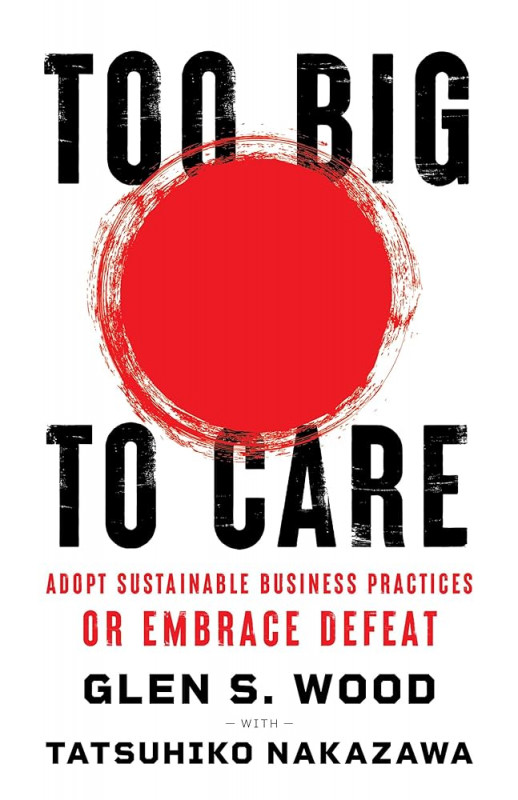
February 6, 2025
Review of “Too Big To Care: Adopt Sustainable Business Practices or Embrace Defeat” by Glen S. Wood
Can big business be kinder to society?
By Trevor Kew
What happens to a society when its companies grow too big to care? What are the consequences when businesses put short-term profits in front of the well-being of their employees, their societies and their environment? These are the questions that Glen S. Wood explores in “Too Big To Care: Adopt Sustainable Business Practices or Embrace Defeat,” written with his current business partner Tatsuhiko Nakazawa.
The book draws heavily upon Wood’s experiences working within Japan’s financial sector. A Canadian who has lived in Japan for over three decades, Wood was involved in a high-profile legal case against his former employer Mitsubishi UFJ Morgan Stanley between 2017 and 2020. Following the birth of his first child in 2015, Wood claimed that he was harassed at work, demoted, docked salary and ultimately fired for trying to use the parental leave that he was guaranteed under Japanese law.
The experience motivated Wood to become an outspoken advocate for the importance of parental leave and draw attention to the broader need for companies to pursue more sustainable business practices in the interests of long-term growth, happiness and prosperity for all.
Read more about Glen Wood’s legal battle over paternity leave in this 2021 Metropolis interview by Caycee Dolan.
Confronting the harmful effects of unsustainable business practices
Wood begins his book with a scenario involving a hypothetical CEO and management team at a major multinational corporation trying to come to grips with the 17 Sustainable Development Goals (SDGs) as laid out by the United Nations. He points out that such high-minded societal goals can seem vague, idealistic and untenable in the face of more immediate and concrete concerns such as stock prices and profit margins. After all, sitting down at your desk with a cup of coffee on a Monday morning and being faced with the task of ending world poverty and hunger (United Nations SDGs #1 and #2) is quite the ask.
Wood then moves on to cite various examples of companies (primarily Japanese or American) that have fallen into unsustainable business practices that have had harmful effects on their employees and societies. While he does discuss damage to the environment (the most commonly understood type of unsustainable activity), Wood also points to the harmful choices that many large companies have made regarding fairness, justice, efficiency, accountability, gender equality and parental rights. Parental rights are, of course, the issue closest to Wood’s heart and thus the topic that he returns to most within the pages of “Too Big to Care.”
Promoting the benefits of sustainable business practices
In Wood’s view, companies should not view SDGs as mere boxes to be ticked or lofty ideals at odds with their primary business objectives. Rather, he argues that companies should pursue sustainable business practices in line with SDGs for one simple reason. If implemented correctly, he argues, SDGs are also good for business.
Wood calls this line of thinking “the power of circles,” an approach that involves reorganizing wasteful linear business practices into more efficient feedback loops. As one example, Wood describes how his own company Smart Vision Logistics (SVL) chose to start seeing food waste as a useful byproduct. His company’s trucks now deliver vegetables directly from farmers to supermarkets where they collect leftover vegetable byproducts to be recycled into fertilizer, thus maximizing efficiency while reducing waste.
Wood applies the same philosophy to his employees’ health and happiness, providing higher salaries, enforcing strict rules against all forms of harassment, and encouraging parental leave for both men and women. He states that this approach benefits the company as it attracts the best and the brightest, thus contributing to its long-term success.
A starting point for important conversations
“Too Big to Care” is an ambitious undertaking that aims to start important conversations about the many ways that companies can improve their own returns while also benefiting society. The book does therefore skip quite quickly over many examples that would benefit from deeper exploration and analysis. With his combined experience as both a businessman and parental rights activist, Wood seems particularly well-poised to delve more deeply into the tension between work and family that confronts Japan and so many other societies around the world today.
“Too Big To Care: Adopt Sustainable Business Practices or Embrace Defeat” is published by Lioncrest Publishing.







